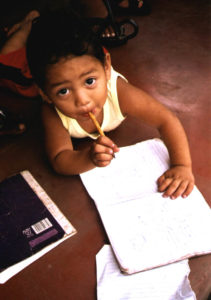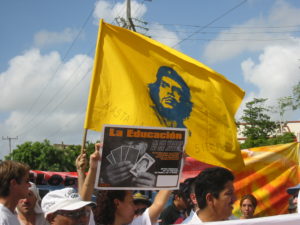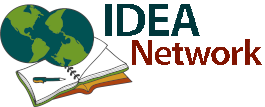What is the IDEA Network?
The Initiative for Democratic Education in the Americas (IDEA) Network is a flexible network that brings together organizations in the Americas that share a commitment to protecting and improving public education, seen as essential to democratic development and the protection of human rights.
While the IDEA network first began in 1998, its structure was broadened and formalized at the Initiative for Democratic Education in the Americas conference held in October 1999 in Quito, Ecuador.
The work of the IDEA Network is guided by an international coordinating committee made up of representatives from different regions of the Americas and sectors of the education community. The Coordinating Committee includes of representatives of the national teachers’ organizations of Argentina, Ecuador, Brazil and Canada, the regional organizations FOMCA (Central American Teachers’ Federation) and CUT (Caribbean Union of Teachers), the Mexican Section of the Tri-National Coalition in Defense of Public Education, the Indigenous Educators’ Network, the Education Research Network, and the Caribbean and Latin American Students’ Organization (OCLAE).
What does IDEA do?

The IDEA network carries out research, establishes communication networks, publishes documents and organizes conferences and seminars related to neoliberalism, trade agreements and the defence of public education. It also organizes hemispheric campaigns to defend public education. The objective of these activities is to lay the groundwork for an understanding of the impact of neoliberal policies on education in the Americas and to develop alternatives to ensure inclusive, democratic and quality public education.
IDEA encompasses two other regional networks: an Education Researchers’ Network (RIE) and an Indigenous Educators’ Network (REI).
The Education Researchers’ Network involves researchers working with educator, student and community organizations in collaborative work that enables us to publish studies that analyze and compare similar situations and education policies in a range of American countries.
The Indigenous Educators’ Network enables first peoples educators to communicate with their counterparts in other countries of the Americas and to share strategies and ideas related to defending culture and autonomy within a publicly funded education system.
Why is the work of the IDEA Network important?
Defending Public Education is International

The struggle to defend public education as a social right is an historic one that does not end with the obtaining of specific demands. It transcends national borders and requires broad social alliances that go beyond the sectoral interests of education workers unions, parents’ groups and student organizations.
With the increased privatization of public education resulting from the neoliberal policies that have accompanied the imposition of globalization since the 1990s, this struggle to defend free, quality public education for our peoples has become more important and is a challenge for all who believe that public education is critical to the development of our countries and the construction of democratic societies.
For more than 20 years, we have seen the privatization of education advance in many our countries, leading to a deterioration of education in public schools, the reduction of access for low-income citizens, the segmentation of education systems, the use of public funds to subsidize private education, and the elimination of labour and union rights for education workers. In the 1990s, large corporations and collaborating governments began to expand neoliberal policies beyond programs of structural adjustment to include a second generation of policies aimed at privatizing everything public, in particular depriving the majority of people of their social rights to health, education and housing.
IDEA is one response to the neoliberal offensive in education, uniting the education community across borders and sectors to roll back privatization efforts and articulate proposals consistent with healthy and democratic public education systems.

